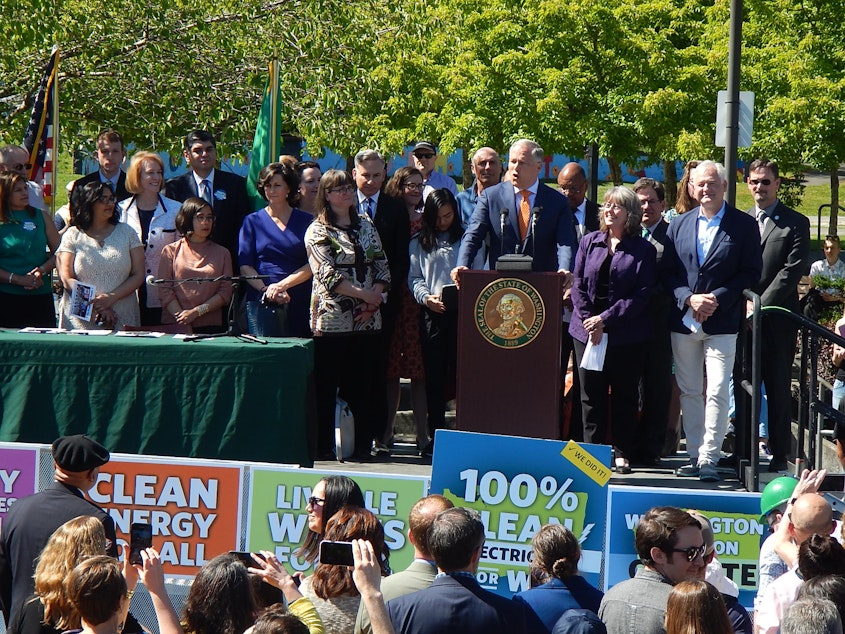Flurry of new laws a big, rare victory for climate-hawk governor

Washington Gov. Jay Inslee signed five pieces of climate legislation into law Tuesday in Seattle—a rare political success for a “climate hawk” governor and presidential candidate who has struggled to curtail greenhouse gas emissions in his state.
With the new laws, Washington state will ban coal power in five years and power from natural gas in 25 years.
“It will lead to a complete transformation of our state's energy grid and provide a model for other states to do the same,” Inslee said at a combination rally and bill-signing event in Seattle’s Rainier Valley.
Electricity consumers could bear the cost of that transformation, but their rates can go up no more than 2 percent a year, under the new law.
With his signature, Washington becomes the fourth state to pass a 100 percent clean electricity mandate. At least six others are considering similar measures.
Other laws signed by Inslee on Tuesday would require buildings and appliances to be more energy-efficient, provide subsidies to electric vehicles and ban hydrofluorocarbons—potent climate-damaging chemicals used in foams and refrigerants.
Sponsored
Backers said the energy-efficiency measures in particular would save consumers money, as well as help keep down the economic damages an altered climate is expected to impose on the world.
Inslee has long pushed for action on climate change, but he's been unable to make a dent in the state's carbon pollution.
“It has been a long time coming, hasn't it?” Inslee said to supporters at the rally. “We've been working on this for months and years and decades.”
Since Inslee became governor in 2012, Washington’s greenhouse gas emissions have gone up at least 6 percent, according to the state’s latest published figures, despite a 2008 state mandate that emissions be reduced to 1990 levels by 2020 and further reduced by 2035 and 2050.
“Fighting the crisis will be a marathon, not a sprint,” Bellevue High School senior Victoria Hsieh told the rally. “We are capable of creating change despite the many obstacles.”
Sponsored
Before this year, Inslee’s main climate initiatives were repeatedly shot down by voters, legislators and the oil industry.
The state is expected to miss next year’s deadline to get its pollution back down to 1990 levels. Even with the laws signed Tuesday, it is not expected meet its 2035 deadline to reduce pollution 25 percent below 1990 levels.
In December, Inslee unveiled a package of policy proposals that aimed to get the state back on track to meet that 2035 mandate.
One key component of that package was rejected by legislators: a proposal to blend climate-friendly biofuels into the state’s gasoline and diesel supplies.
Transportation is the state’s biggest climate offender, with cars and trucks puffing out nearly one-third of the state’s carbon pollution.
Sponsored
Not King Coal
Washington has long relied primarily on carbon-neutral hydropower for its electricity, making a shift to clean electricity less onerous—and, Republican legislators argued, less important—here than elsewhere.
Still, the state’s biggest utility, Puget Sound Energy, gets 38 percent of its power from coal. The privately owned utility co-owns the Colstrip power plant in Montana.
Puget Sound Energy senior vice president David Mills said the utility has not determined yet how it will replace that coal power in five years.
“We're looking at any and all options with the final disposition of Colstrip,” he said.
Sponsored
Selling that dirty power outside of Washington state—defeating the climate-saving purpose of the new law—is allowed. But Mills said that was unlikely, with California, Oregon and Washington all having similar restrictions on coal power.
“What you end up with is an oversupply of coal generation and very limited transmission to move it out of those coal-generating states,” he said.
“The economics of running a coal-fired power plant are poor anyway,” Democratic Rep. Joe Fitzgibbon of Seattle said. “Even without laws like this, those coal plants are already on track to shut down.”
Inslee is running for president on a platform of making climate change the nation’s top priority.
A CNN poll in April found that “aggressive action to slow the effects of climate change” was the top priority among Democratic voters, beating out other top issues like health insurance for all and gun control.
Sponsored
It also found Inslee only had the support of 1 percent of Democratic voters.
His platform calls for cutting the nation’s carbon pollution in half by 2030 and ending it by 2045—a pace of cleanup roughly in line with what scientists say is necessary to keep the world from heating a catastrophic 2 degrees Celsius (3.6 degrees Fahrenheit) or more.
Those cuts are much steeper than Inslee has enacted or even proposed in his home state.

